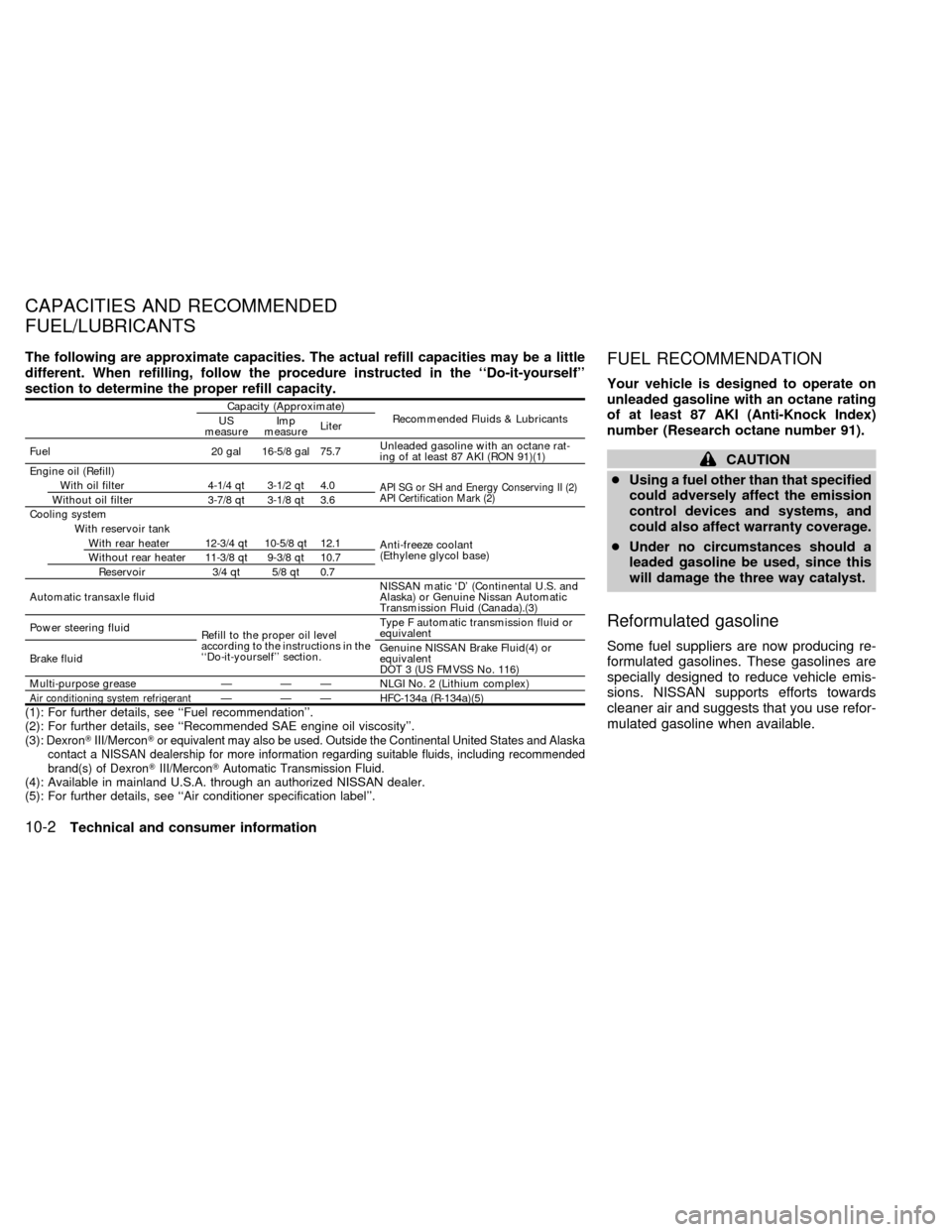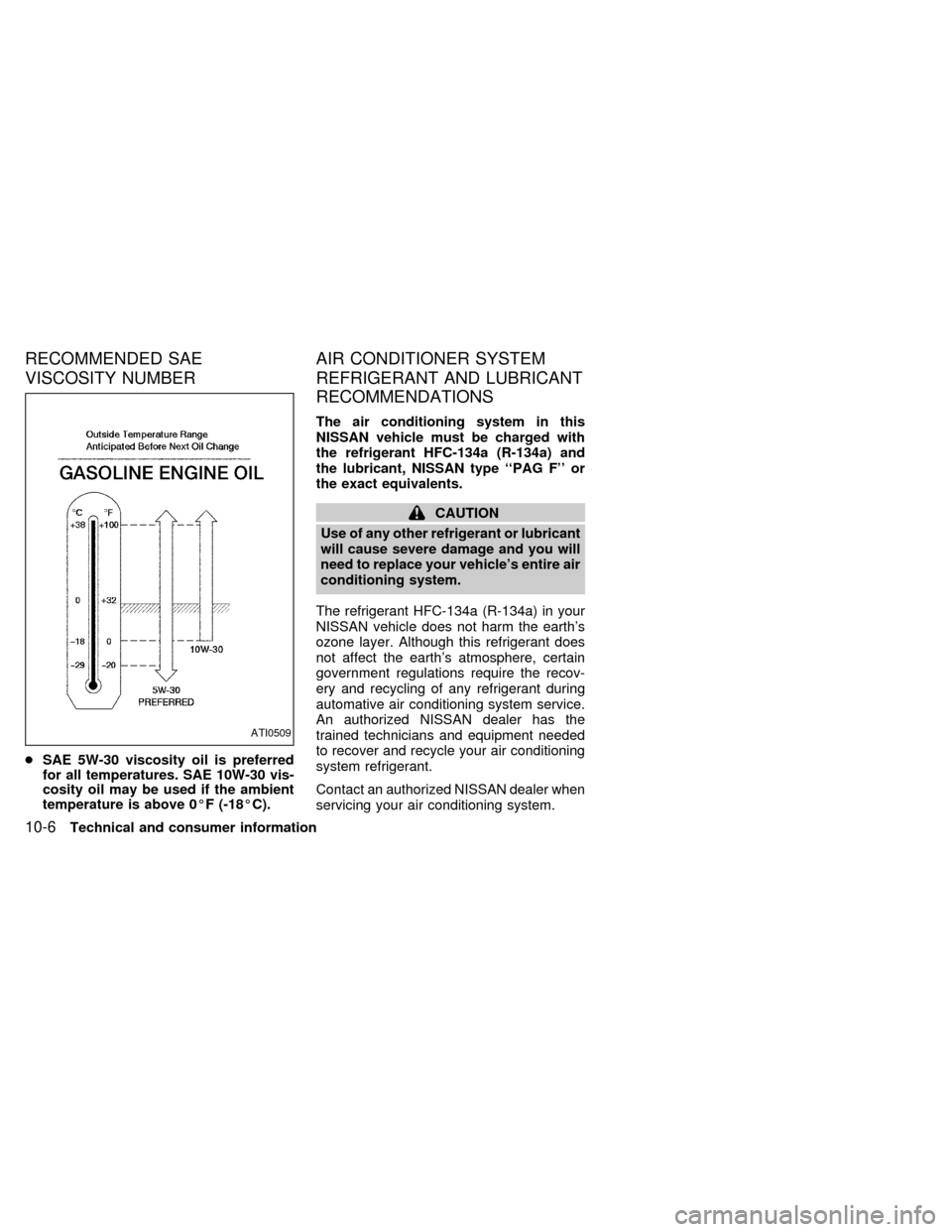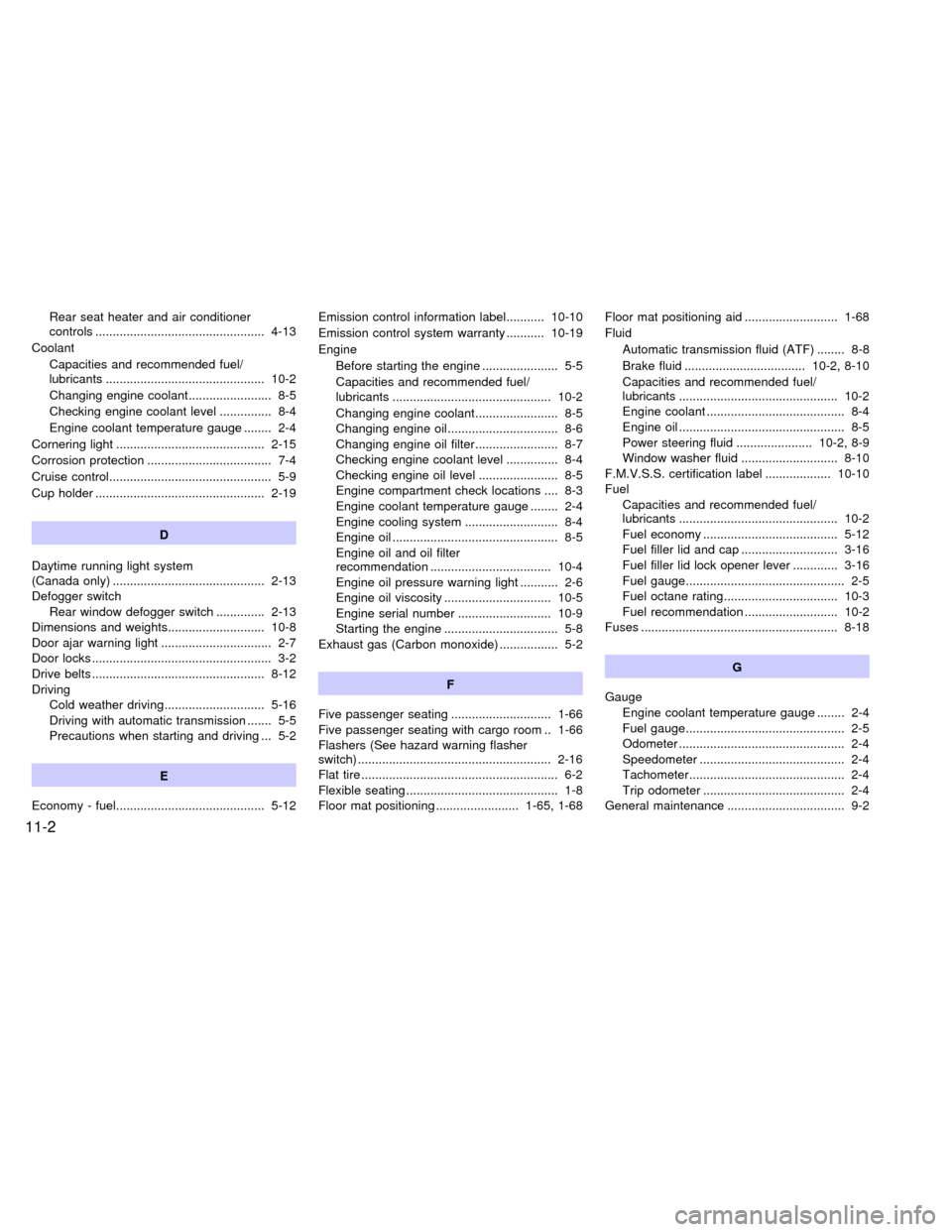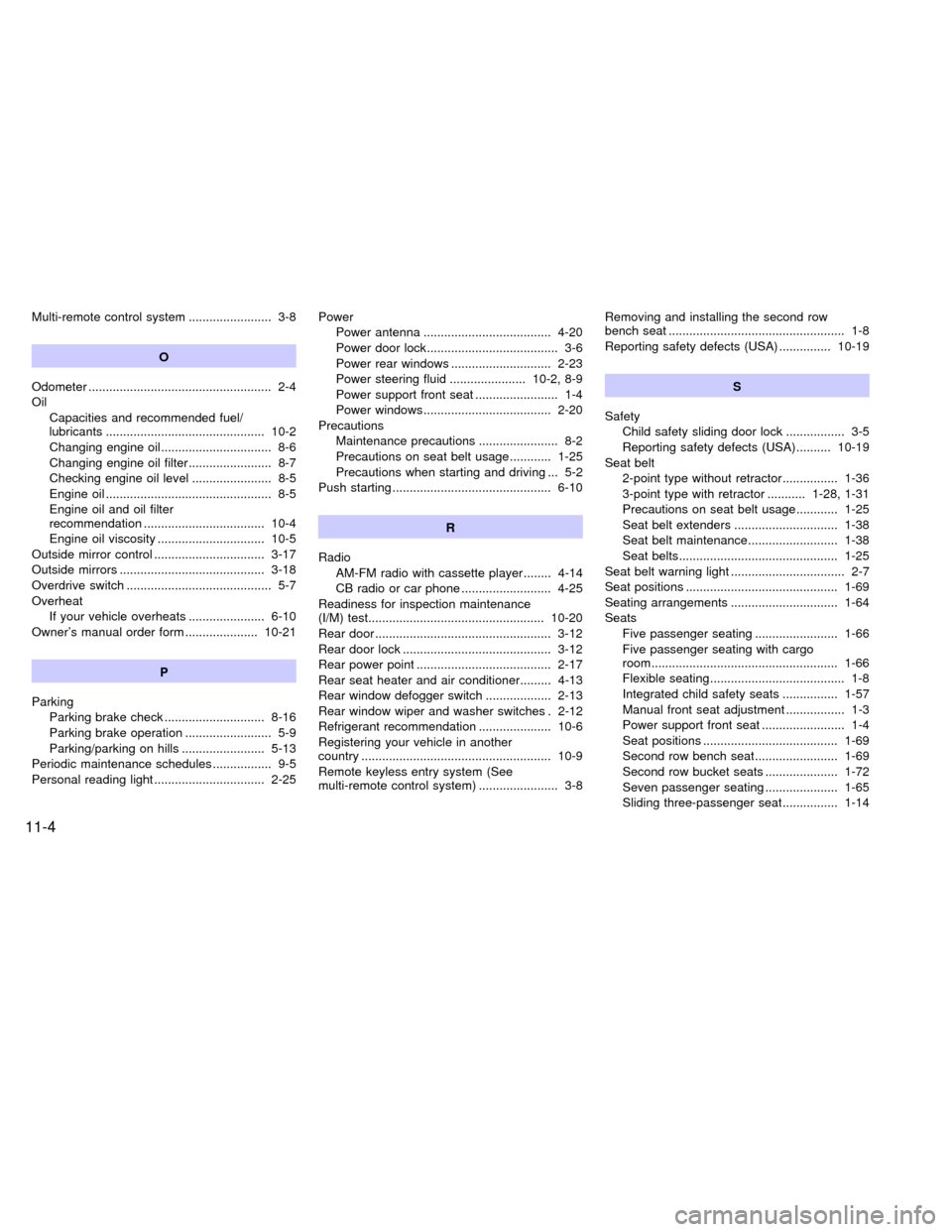1998 NISSAN QUEST oil viscosity
[x] Cancel search: oil viscosityPage 232 of 260

10 Technical and consumer information
Capacities and recommended fuel/lubricants ......10-2
Fuel recommendation...........................................10-2
Engine oil and oil filter recommendation..............10-4
Recommended SAE viscosity number.................10-6
Air conditioner system refrigerant and
lubricant recommendations ..................................10-6
Engine ..................................................................10-7
Wheel/tire size ......................................................10-8
Dimensions and weights ......................................10-8
Registering your vehicle in another country ........10-9
Vehicle identification ............................................10-9
Vehicle identification number (VIN) plate.............10-9
Engine serial number ...........................................10-9F.M.V.S.S. certification label ..............................10-10
Emission control information label .....................10-10
Tire placard ........................................................10-11
Air conditioner specification label.......................10-11
Installing the license plate ..................................10-11
Vehicle loading information ................................10-12
Trailer towing ......................................................10-13
Uniform tire quality grading ................................10-18
Emission control system warranty .....................10-19
Reporting safety defects (USA) .........................10-19
Readiness for inspection/maintenance (I/M)
test ......................................................................10-20
ZX
Page 233 of 260

The following are approximate capacities. The actual refill capacities may be a little
different. When refilling, follow the procedure instructed in the ``Do-it-yourself''
section to determine the proper refill capacity.
Capacity (Approximate)
Recommended Fluids & Lubricants
US
measureImp
measureLiter
Fuel 20 gal 16-5/8 gal 75.7Unleaded gasoline with an octane rat-
ing of at least 87 AKI (RON 91)(1)
Engine oil (Refill)
With oil filter 4-1/4 qt 3-1/2 qt 4.0
API SG or SH and Energy Conserving II (2)
API Certification Mark (2)Without oil filter 3-7/8 qt 3-1/8 qt 3.6
Cooling system
With reservoir tank
With rear heater 12-3/4 qt 10-5/8 qt 12.1
Anti-freeze coolant
(Ethylene glycol base)
Without rear heater 11-3/8 qt 9-3/8 qt 10.7
Reservoir 3/4 qt 5/8 qt 0.7
Automatic transaxle fluidNISSAN matic `D' (Continental U.S. and
Alaska) or Genuine Nissan Automatic
Transmission Fluid (Canada).(3)
Power steering fluid
Refill to the proper oil level
according to the instructions in the
``Do-it-yourself'' section.Type F automatic transmission fluid or
equivalent
Brake fluidGenuine NISSAN Brake Fluid(4) or
equivalent
DOT 3 (US FMVSS No. 116)
Multi-purpose grease Ð Ð Ð NLGI No. 2 (Lithium complex)
Air conditioning system refrigerantÐ Ð Ð HFC-134a (R-134a)(5)(1): For further details, see ``Fuel recommendation''.
(2): For further details, see ``Recommended SAE engine oil viscosity''.
(3):
DexronTIII/MerconTor equivalent may also be used. Outside the Continental United States and Alaska
contact a NISSAN dealership for more information regarding suitable fluids, including recommended
brand(s) of DexronTIII/MerconTAutomatic Transmission Fluid.
(4): Available in mainland U.S.A. through an authorized NISSAN dealer.
(5): For further details, see ``Air conditioner specification label''.
FUEL RECOMMENDATION
Your vehicle is designed to operate on
unleaded gasoline with an octane rating
of at least 87 AKI (Anti-Knock Index)
number (Research octane number 91).
CAUTION
cUsing a fuel other than that specified
could adversely affect the emission
control devices and systems, and
could also affect warranty coverage.
cUnder no circumstances should a
leaded gasoline be used, since this
will damage the three way catalyst.
Reformulated gasoline
Some fuel suppliers are now producing re-
formulated gasolines. These gasolines are
specially designed to reduce vehicle emis-
sions. NISSAN supports efforts towards
cleaner air and suggests that you use refor-
mulated gasoline when available.
CAPACITIES AND RECOMMENDED
FUEL/LUBRICANTS
10-2Technical and consumer information
ZX
Page 235 of 260

of the vehicle, for which NISSAN is not
responsible.
Incorrect ignition timing may result in spark
knock, after-run, and/or overheating, which
may cause excessive fuel consumption or
engine damage. If any of the above symp-
toms are encountered, have your vehicle
checked at an authorized NISSAN dealer or
other competent service facility.
However, now and then you may notice
light spark knock for a short time while
accelerating or driving up hills. This is
no cause for concern, because you get
the greatest fuel benefit when there is
light spark knock for a short time under
heavy engine load.
ENGINE OIL AND OIL FILTER
RECOMMENDATION
Selecting the correct oil
It is essential to chose engine oil with the
correct quality and viscosity to ensure sat-
isfactory engine life and performance. NIS-
SAN recommends the use of a low friction
oil (energy conserving oil) in order to im-
prove fuel economy and conserve energy.
Oils which do not have the specified quality
label should not be used as they could
cause engine damage.Only those engine oils with the American
Petroleum Institute (API) CERTIFICATION
MARK on the front of the container should
be used. This type of oil supersedes the
existing API SG or SH and Energy Conserv-
ing II categories.
If you cannot find engine oil with the CER-
TIFICATION MARK, an API SG or SH, an
Energy Conserving II oil with the API Ser-
vice Symbol may be used. An oil with a
single designation SG or SH, or in combi-
nation with other categories (for example,
SG/CC or SG/CD) may also be used if one
ATI0507
10-4Technical and consumer information
ZX
Page 236 of 260

with the API CERTIFICATION MARK can-
not be found.
Mineral based or synthetic type oils may be
used in your NISSAN vehicle. These oils
must, however, meet the API quality and
SAE viscosity ratings specified for your ve-
hicle. Do not mix mineral based and syn-
thetic type oils in the engine.
Oil additives
NISSAN does not recommend the use of oil
additives. The use of an oil additive is not
necessary when the proper oil type is used
and maintenance intervals are followed.
Oil which may contain foreign matter or has
been previously used should not be used.
Oil viscosity
The engine oil viscosity or thickness
changes with temperature. Because of this,
it is important to select the engine oil viscos-
ity based on the temperatures at which the
vehicle will be operated before the next oil
change. The chart ``Recommended SAE
viscosity number'' shows the recommended
oil viscosities for the expected ambient tem-
peratures. Choosing an oil viscosity otherthan that recommended could cause seri-
ous engine damage.
Selecting the correct oil filter
Your new NISSAN vehicle is equipped with
a high- quality genuine NISSAN oil filter.
When replacing, use a genuine NISSAN oil
filter or its equivalent for the reason de-
scribed in ``Change intervals''.
Change intervals
The oil and oil filter change intervals for your
engine are based on the use of the specified
quality oils and filters. Oil and filter other
than the specified quality, or oil and filter
change intervals longer than recommended
could reduce engine life. Damage to the
engine caused by improper maintenance or
use of incorrect oil and filter quality and/or
viscosity is not covered by the new NISSAN
vehicle warranties.
Your engine was filled with a high quality
engine oil when it was built. You do not have
to change the oil before the first recom-
mended change interval. Oil and filter
change intervals depend upon how you use
your vehicle. Operation under the following
conditions may require more frequent oil
and filter changes:Ð repeated short distance driving at cold
outside temperatures,
Ð driving in dusty conditions,
Ð extensive idling,
Ð towing a trailer.
Technical and consumer information
10-5
ZX
Page 237 of 260

RECOMMENDED SAE
VISCOSITY NUMBER
cSAE 5W-30 viscosity oil is preferred
for all temperatures. SAE 10W-30 vis-
cosity oil may be used if the ambient
temperature is above 0ÉF (-18ÉC).
AIR CONDITIONER SYSTEM
REFRIGERANT AND LUBRICANT
RECOMMENDATIONS
The air conditioning system in this
NISSAN vehicle must be charged with
the refrigerant HFC-134a (R-134a) and
the lubricant, NISSAN type ``PAG F'' or
the exact equivalents.
CAUTION
Use of any other refrigerant or lubricant
will cause severe damage and you will
need to replace your vehicle's entire air
conditioning system.
The refrigerant HFC-134a (R-134a) in your
NISSAN vehicle does not harm the earth's
ozone layer. Although this refrigerant does
not affect the earth's atmosphere, certain
government regulations require the recov-
ery and recycling of any refrigerant during
automative air conditioning system service.
An authorized NISSAN dealer has the
trained technicians and equipment needed
to recover and recycle your air conditioning
system refrigerant.
Contact an authorized NISSAN dealer when
servicing your air conditioning system.
ATI0509
10-6Technical and consumer information
ZX
Page 255 of 260

Rear seat heater and air conditioner
controls ................................................. 4-13
Coolant
Capacities and recommended fuel/
lubricants .............................................. 10-2
Changing engine coolant........................ 8-5
Checking engine coolant level ............... 8-4
Engine coolant temperature gauge ........ 2-4
Cornering light ........................................... 2-15
Corrosion protection .................................... 7-4
Cruise control............................................... 5-9
Cup holder ................................................. 2-19
D
Daytime running light system
(Canada only) ............................................ 2-13
Defogger switch
Rear window defogger switch .............. 2-13
Dimensions and weights............................ 10-8
Door ajar warning light ................................ 2-7
Door locks .................................................... 3-2
Drive belts .................................................. 8-12
Driving
Cold weather driving............................. 5-16
Driving with automatic transmission ....... 5-5
Precautions when starting and driving ... 5-2
E
Economy - fuel........................................... 5-12Emission control information label........... 10-10
Emission control system warranty ........... 10-19
Engine
Before starting the engine ...................... 5-5
Capacities and recommended fuel/
lubricants .............................................. 10-2
Changing engine coolant........................ 8-5
Changing engine oil................................ 8-6
Changing engine oil filter........................ 8-7
Checking engine coolant level ............... 8-4
Checking engine oil level ....................... 8-5
Engine compartment check locations .... 8-3
Engine coolant temperature gauge ........ 2-4
Engine cooling system ........................... 8-4
Engine oil ................................................ 8-5
Engine oil and oil filter
recommendation ................................... 10-4
Engine oil pressure warning light ........... 2-6
Engine oil viscosity ............................... 10-5
Engine serial number ........................... 10-9
Starting the engine ................................. 5-8
Exhaust gas (Carbon monoxide) ................. 5-2
F
Five passenger seating ............................. 1-66
Five passenger seating with cargo room .. 1-66
Flashers (See hazard warning flasher
switch) ........................................................ 2-16
Flat tire ......................................................... 6-2
Flexible seating ............................................ 1-8
Floor mat positioning ........................ 1-65, 1-68Floor mat positioning aid ........................... 1-68
Fluid
Automatic transmission fluid (ATF) ........ 8-8
Brake fluid ................................... 10-2, 8-10
Capacities and recommended fuel/
lubricants .............................................. 10-2
Engine coolant ........................................ 8-4
Engine oil ................................................ 8-5
Power steering fluid ...................... 10-2, 8-9
Window washer fluid ............................ 8-10
F.M.V.S.S. certification label ................... 10-10
Fuel
Capacities and recommended fuel/
lubricants .............................................. 10-2
Fuel economy ....................................... 5-12
Fuel filler lid and cap ............................ 3-16
Fuel filler lid lock opener lever ............. 3-16
Fuel gauge.............................................. 2-5
Fuel octane rating................................. 10-3
Fuel recommendation ........................... 10-2
Fuses ......................................................... 8-18
G
Gauge
Engine coolant temperature gauge ........ 2-4
Fuel gauge.............................................. 2-5
Odometer ................................................ 2-4
Speedometer .......................................... 2-4
Tachometer............................................. 2-4
Trip odometer ......................................... 2-4
General maintenance .................................. 9-2
11-2
ZX
Page 257 of 260

Multi-remote control system ........................ 3-8
O
Odometer ..................................................... 2-4
Oil
Capacities and recommended fuel/
lubricants .............................................. 10-2
Changing engine oil................................ 8-6
Changing engine oil filter........................ 8-7
Checking engine oil level ....................... 8-5
Engine oil ................................................ 8-5
Engine oil and oil filter
recommendation ................................... 10-4
Engine oil viscosity ............................... 10-5
Outside mirror control ................................ 3-17
Outside mirrors .......................................... 3-18
Overdrive switch .......................................... 5-7
Overheat
If your vehicle overheats ...................... 6-10
Owner's manual order form ..................... 10-21
P
Parking
Parking brake check ............................. 8-16
Parking brake operation ......................... 5-9
Parking/parking on hills ........................ 5-13
Periodic maintenance schedules ................. 9-5
Personal reading light ................................ 2-25Power
Power antenna ..................................... 4-20
Power door lock...................................... 3-6
Power rear windows ............................. 2-23
Power steering fluid ...................... 10-2, 8-9
Power support front seat ........................ 1-4
Power windows..................................... 2-20
Precautions
Maintenance precautions ....................... 8-2
Precautions on seat belt usage............ 1-25
Precautions when starting and driving ... 5-2
Push starting .............................................. 6-10
R
Radio
AM-FM radio with cassette player ........ 4-14
CB radio or car phone .......................... 4-25
Readiness for inspection maintenance
(I/M) test................................................... 10-20
Rear door ................................................... 3-12
Rear door lock ........................................... 3-12
Rear power point ....................................... 2-17
Rear seat heater and air conditioner......... 4-13
Rear window defogger switch ................... 2-13
Rear window wiper and washer switches . 2-12
Refrigerant recommendation ..................... 10-6
Registering your vehicle in another
country ....................................................... 10-9
Remote keyless entry system (See
multi-remote control system) ....................... 3-8Removing and installing the second row
bench seat ................................................... 1-8
Reporting safety defects (USA) ............... 10-19
S
Safety
Child safety sliding door lock ................. 3-5
Reporting safety defects (USA) .......... 10-19
Seat belt
2-point type without retractor................ 1-36
3-point type with retractor ........... 1-28, 1-31
Precautions on seat belt usage............ 1-25
Seat belt extenders .............................. 1-38
Seat belt maintenance.......................... 1-38
Seat belts.............................................. 1-25
Seat belt warning light ................................. 2-7
Seat positions ............................................ 1-69
Seating arrangements ............................... 1-64
Seats
Five passenger seating ........................ 1-66
Five passenger seating with cargo
room...................................................... 1-66
Flexible seating....................................... 1-8
Integrated child safety seats ................ 1-57
Manual front seat adjustment ................. 1-3
Power support front seat ........................ 1-4
Seat positions ....................................... 1-69
Second row bench seat........................ 1-69
Second row bucket seats ..................... 1-72
Seven passenger seating ..................... 1-65
Sliding three-passenger seat................ 1-14
11-4
ZX
Page 260 of 260

Recommended fuel:
Unleaded gasoline, at least 87 AKI number
(RON 91).
For further details such as gasohol, see
``Fuel recommendation'' in the ``Technical
and consumer information'' section.
Recommended engine oil:
cAPI SG or SH and Energy Conserving II
cAPI Certification Mark
cSAE 5W-30 viscosity oil is preferred for
all ambient temperatures
See ``Engine oil and oil filter recommenda-
tion'' in the ``Technical and consumer infor-
mation'' section.
Cold tire pressure:
See tire placard affixed to the glove com-
partment lid.
Recommended new vehicle
break-in procedure:
During the first 1,000 miles (1,600 km) of
vehicle use, follow the recommendations
outlined in the ªBreak-in schedule'' informa-
tion found in the ªStarting and Drivingº sec-
tion of this Owner's Manual. Follow these
recommendations for the future reliability
and economy of your new vehicle. Failure to
follow these recommendations may result in
vehicle damage or shortened engine life.
AGS1009
GAS STATION INFORMATION QUICK REFERENCE
ZX